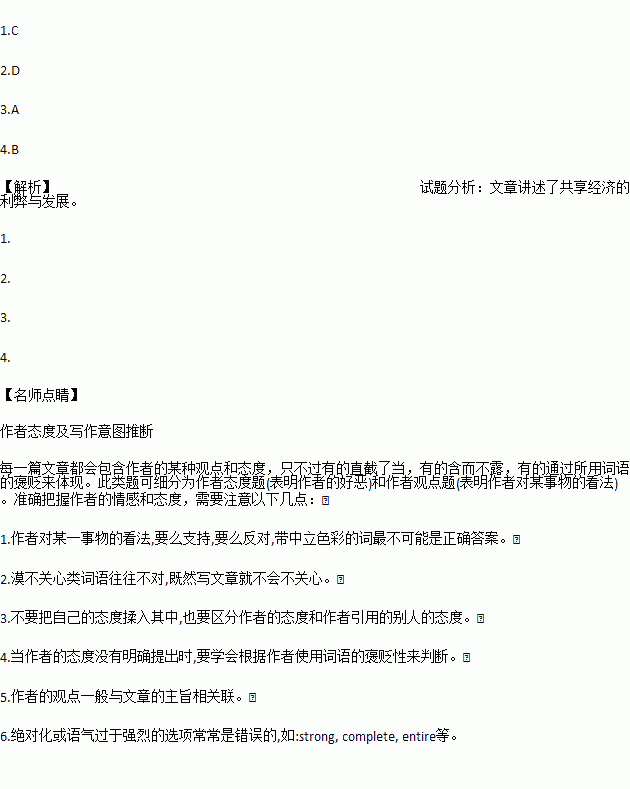题目内容
The sharing economy, represented by companies like Airbnb or Uber, is the latest fashion craze. But many supporters have overlooked the reality that this new business model is largely based on escaping regulations and breaking the law.
Airbnb is an Internet-based service that allows people to rent out spare rooms to strangers for short stays. Uber is an Internet taxi service that allows thousands of people to answer ride requests with their own cars. There are hundreds of other such services.
The good thing about the sharing economy is that it promotes the use of underused resources. Millions of people have houses or apartments with empty rooms, and Airbnb allows them to profit from these rooms while allowing guests a place to stay at prices that are often far less than those charged by hotels. Uber offers prices that are competitive with standard taxi prices and their drivers are often much quicker and more trustworthy.
But the downside of the sharing economy has gotten much less attention. Most cities and states both tax and regulate hotels, and the tourists who stay in hotels are usually an important source of tax income. But many of Airbnb’s customers are not paying the taxes required under the law.
Airbnb can also raise issues of safety for its customers and trouble for hosts’ neighbors. Hotels are regularly inspected to ensure that they are not fire traps and that they don’t form other risks for visitors. Airbnb hosts face no such inspections.
Since Airbnb is allowing people to escape taxes and regulations, the company is simply promoting thefts. Others in the economy will lose by bearing an additional tax burden or being forced to live next to an apartment unit with a never-ending series of noisy visitors.
The same story may apply with Uber. Uber is currently in disputes over whether its cars meet the safety and insurance requirements imposed on standard taxis. Also, if Uber and related services flood the market, they could harm all taxi drivers’ ability to earn a minimum wage.
This downside of the sharing needs to be taken seriously, but that doesn’t mean the current tax and regulatory structure is perfect.
1.What is the positive thing about the sharing economy?
A. It is a global trend.
B. It is beyond regulations.
C. It draws on spare resources.
D. It brings in modest profits.
2.What is the problem with Airbnb customers according to the passage?
A. They are not regularly inspected.
B. They are likely to commit thefts.
C. They are allowed not to pay taxes.
D. They can be noisy to hosts’ neighbours.
3.What is the argument over Uber according to the passage?
A. Whether it guarantees customers’ safety.
B. Whether it provides reliable services.
C. Whether it lowers customers’ expenses.
D. Whether it can compete with standard taxis.
4.What will be talked about in the following paragraphs?
A. Existing regulations and laws.
B. Necessary improvements of current laws.
C. Further development of Airbnb and Uber.
D. More downsides of Airbnb and Uber.

